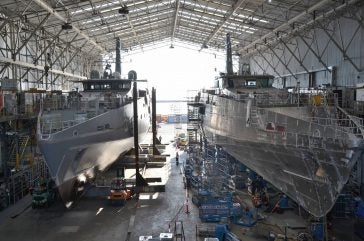
Austal Limited has announced on 30 August its financial results for the fiscal year ending June 2024, reporting a notable improvement in earnings despite a slight decline in revenue.
The company announced on an Earnings Before Interest and Tax (EBIT) for 2024 of $56.5m, a significant turnaround from the $4.8m loss in the previous financial year.
This improvement was achieved on a revenue of $1.47bn, which was down by 7% from the $1.59bn reported in FY2023. Those low revenues wer largely due to reduced contributions from shipbuilding activities as the company transitioned between programmes, particularly in the USA.
The turnaround is a positive indicator of Austal’s ability to adapt to a changing market and material conditions, and suggests the company was successful in optimising costs and improving margins in key areas. However, the influence of exceptional items on the EBIT figure demands proper examination from investors.
Breaking down the EBIT turnaround
The positive EBIT result of 2024 was driven by new contributions from Austal’s operations in the United States, where the company saw a resurgence in shipbuilding profitability, particularly from advanced programmes like the Littoral Combat Ships (LCS) and Expeditionary Fast Transports (EPF).
However, the EBIT figure also included significant exceptional items, such as $57m in legal costs related to the resolution of a longstanding US regulatory investigation and a $54m profit from the sale of land in Mobile, Alabama. After accounting for these items, Austal reported a Net Profit After Tax (NPAT) of $14.9m, a reversal from the net loss of $13.8m in FY2023.
Austal’s financial position remains robust, with cash at bank totalling $173.5m as of 30 June 2024, slightly down from $179.2m the previous year. The company ended the year with a net cash position of $3.9m, down from $49.7m, reflecting a net operating cash outflow of $13m. This was in contrast to the $86.7m inflow reported in FY2023, largely influenced by the timing of milestone payments.
The reduction in net cash and the shift to a cash outflow position indicates potential liquidity pressures, especially in light of the upcoming capital expenditure program to expand shipbuilding capacity in the US. The decision to withhold dividends for FY2024, while prudent in maintaining balance sheet strength, may be a disappointment to shareholders expecting returns.
Austal reported a record order book valued at $12.7bn, which includes both contracted work and options, after successfully securing new defence contracts in the US, as well as anticipated awards in Australia under the Strategic Shipbuilding Agreement (SSA). The book value is a clear strength for Austal, and illustrates a solid foundation for future revenue.
The SSA is expected to underpin Austal’s long-term order book in Australia, with potential projects including the construction of Landing Craft (Medium and Heavy) and General Purpose Frigates.
Despite these successes, Austal’s Australasia segment underperformed, with a 17.3% decline in revenue to $302.m due to fewer commercial shipbuilding contracts and delays in government awards. The significant decline in the Australasia segment’s revenue and EBIT is a concerning aspect of the report. The segment recorded an EBIT loss of $12.6m, compared to a $15.8m profit in the previous year. Nevertheless, recent contract wins and the anticipated SSA are expected to drive a recovery in the region.



